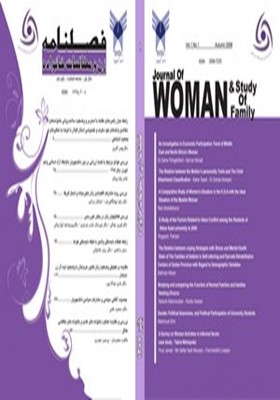رابطه میان راهبردهای مقابله با استرس و وضعیت سلامت روانی خانواده های معتادین مراکز ترک اعتیاد استان گیلان با توجه به متغیرهای جمعیت شناختی
محورهای موضوعی : زن و خانواده
کلید واژه: استرس, راهبردهای مقابله با استرس, سلامت روانی ,
چکیده مقاله :
مطالعه حاضر به بررسی رابطه بین راهبردهای مقابله با استرس و وضعیت سلامت گیلان می پردازد. به همین منظور تعداد 251 نفر از خانواده های مراجعان (همسران و روانی در میان خانواده های معتادین سرپایی واحدهای خود معرف و خصوصی استان والدین) که جهت ترک مواد فرزندان و همسران خود به مراکز خود معرف و خصوصی مراجعه کرده بودند به صورت نمونه گیری تصادفی انتخاب شدند روش پژوهشی توصیفی- مقطعی بود و هدف پژوهش تعیین رابطه بین انواع راهبردهای مقابله با استرس و وضعیت سلامت روانی با توجه به متغیرهای جمعیت شناختی بود و به همین جهت برای جمع آوری اطلاعات از پرسشنامه های سبک های مقابله (C.S.Q) و پرسشنامه سلامت عمومی (G.H.Q) استفاده گردید و سرانجام داده ها با استفاده از روشهای آمار توصیفی (میانگین، انحراف معیار و...) و آمار استنباطی (ضریب همبستگی و رگرسیون) مورد تحلیل قرار گرفتند. بررسی ضریب همبستگی بین سلامت روانی با راهبردهای مسأله مدار، هیجان مدار و انفصالی تا سطح بیش از 99 درصد تأیید می گردد. همچنین سلامت روانی با راهبرد اجتنابی دارای همبستگی نمی باشد. به عبارت دیگر بین سلامت روانی با راهبرد مساله مدار (34/0=r) و راهبرد هیجان مدار با سلامت روانی (50/0=r) و انفصالی با سلامت روانی (18/0=r) در سطح معناداری 05/0 رابطه وجود دارد. و همچنین بین راهبرد هیجان مدار با سلامت روانی (034/0=r) می باشد که در سطح آلفای 05/0 معنادار نمی باشد. به علاوه بین راهبرد مقابله مساله مدار و وضعیت سلامت روانی با توجه به متغیرهای جمعیت شناختی رابطه معنی دار وجود داشت و میزان رابطه تا سطح اطمینان بیش از 99/0 درصد تائید می گردد و نتایج حاصل از اجرای آزمون آماری رگرسیون معادله پیش بینی بیشترین سهم را در راهبرد مقابله مسأله مدار و وضعیت سلامت روانی دارد؛ ولی رابطه سایر راهبردهای اجتنابی، هیجانی و انفصالی با سلامت روانی با توجه به متغیرهای جمعیت شناختی معنی دار نبود.
The present research studiesThe relation between coping strategies with stress and the mental health state in the families of the flying addicts in self referring and private rehab centers of Guilan province. For this purpose, 251 families (parents or spouses) who referred to self- referring and private rehab centers to break their children or spouses of addiction were selected by random sampling. The research method was cross sectional – descriptive, and the purpose of the research was to determine the relation between types of coping strategies with stress and mental health condition with regard to demographic variables. There fore, in order to collect data, the coping strategies questionnaire (C.S.Q) and mental Health The questionnaire (G.H.Q) were used, and finally The data were analyzed by descriptive statistical methods (average, standard deviation,…) and inferential statistics (correlation coefficient and regression). The Study of correlation coefficient between mental health and problem- focused, emotion- focused, and detachment strategies confirmed The relation up to above 99% Furthermore, The study showed lack of correlation between mental health and avoidance strategy.in other words, There is a significant relation(0.05) between mental health and problem-focused strategy (r= 0/34) mental health and emotion-Focused strategy (r=0.50) and mental health and detachment strategy (r=0.18) Moredver, The relation between emoltion-focused strategy and mental health is (r= 0.034), which is not significant at & = 0.05. Also, there was a siginificant relation between problem- pocussed strategy and mental health condition with regard to demographic variables, and the relation was confirmed up to above 99% confidence level. The results of regression statistical test, the anticipation equation was the highest for the relation between problem-focused strategy and mental health condition. However, the relation between emotion-focused, detachment and avoidance strategies and mental health with regard to demographic varialbles was not significant.
- اتکنسیون، رتیال، هیلگارد، ارنست. (1986). زمینه شناسی، جلد دوم، ترجمه براهنی و همکاران (1376)، انتشارات رشد
- پیرمرادی، سعید. (1378). اعتیاد به موادمخدر، در آینه روابط خانوادگی، تهران. نشرهام
- پاول، انرایت .(1982). شیوه های مقابله با فشار روانی، ترجمه بخشی پور، 1386، انتشارات رشد
- پاکنژاد، محسن. (1372). هنجاریابی پرسشنامه سبک های مقابله ای برروی دانشجویان دانشگاه آزاد اسلامی تهران شمال، پایان نامهکارشناسی ارشد ،
- دانشگاه آزاد اسلامی واحد کرج
- ساعتچی، محمود. (1376). روانشناسی بهره وری، انتشارات نشر ویرایش تهران
- کالات، جیمز.(2005). روانشناسی عمومی، جلددوم، ترجمه یحیی سیدمحمدی (1386)، نشر روان
- Abramson, L.Y. Seligman, M.Eop& Feasdaley (1978) "Learned helplessness in human" Critiaue and reformulation – Journal of Abnormal Psychology, 87, 49-74.
- Cohen, S, Evans, G.W. Stokols, Krantz.D.S (1986): Behavior, health and Enviornmental Stress, New York.
- Cohen,S. Doyle,W.J, Turner,R Alper,G.M, 8skoner D.P (2003). Sociability and susceptibility to the common cold. Psychological science, H.389-395(12).
- Lazarus, S. Richard: (1993) "Psychological Stress and Coping". American. J.of Psychology. S.Richard: Postpresent, Future" Psych, Samatic medicine.55, 234-244.
- Josepho – Sharon –A – Plutchik- Robert. (1997)"Stress, coping, and suicide risk In Psychiatric In Patients" JN.Suicide- and –L: Fe Threatening- Behavior; Spr Vol 24(1) 48-57
- Maunsell,E., Brisson , j,mondor,m.verreault R, & Desechenes, L.(2001).Stressful life events and survival after breast cancer. Psychosomatic medicine, 63,306-315(12).
- Robins, Paul-R-Tank, Roland –H. (1992)" Stress, coping Techniques, and depressed affect” JN.Psychological – Reports, Fed Vol 70 (1) 147-152.

